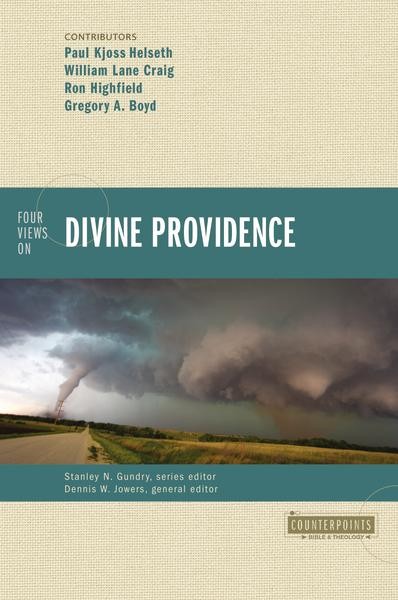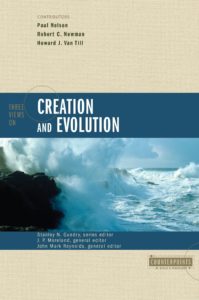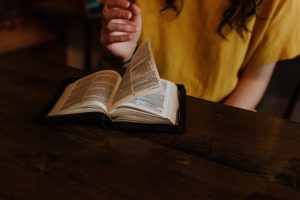
Year Published
2011
Authors
Topics
Synopsis
Overall Rating
Final Thoughts
Year Published
2011
Authors
Topics
Synopsis
Final Thoughts
Overall Rating
One topic that causes a lot of controversy within the Christian community, and headaches for those trying to defend it from those who oppose it, is divine providence. How much of the future does God know? How much does he control? If He controls everything does that mean He controls evil, and would that make Him evil as well? Each of these questions is answered differently dependent upon your view of divine providence. Here I’ll explore four basic views and then discuss which I find to be the most convincing.
I’m writing this post in each section after I finish said section in the book, that way all the points of the authors and thoughts of my own are least confused and mixed up. It also allows you to see my progression through the material best.
My favorite thing about this book is that in the beginning, it goes through the historical progressions in divine providence. It doesn’t just say things are new beliefs, it shows how all of them held some form of weight throughout the ages and who advanced which. It’s nice for people to recognize that things aren’t always “this has been tradition and you’re changing it!” but that each view has a rich tradition dating back to the early centuries.
Reformed View
The reformed view of divine providence states that God directs every individual event that happens. Holders of this believe contend that God has much control in whether or not your toast lands butter side down as he did in the creation of the cosmos. They stand that in order for things to have significance this must be true.
In order to defend this belief, they bring it back to the beginning. Nothing happened without God. Which is true. Everything was created by God and therefore has its origins in Him. However, they extend that to the full existence and events of everything as well. Rather than allowing evil to happen, Reformed theologians believe God causes evil to happen, all evil. To them, nothing that happens is not controlled by God.
They say that this is the most Biblical view of providence, but, they don’t defend it. They simply state that it follows the Bible best. Unfortunately, without their defense, it can’t be seen easily in the Bible. We see many times things happening that God didn’t want to happen- case and point: the fall of Adam and Eve. Were God controlling every action, then why would he make that happen? Certainly, he wants to redeem it now that it has happened, but wasn’t His plan to originally simply live with humans in the garden? Why on earth would He control them to go against him?
The other major problem (at least with this presentation of the view) is that it spent most of its time using wordy sentences about what believing the view does and why we shouldn’t believe in the open theist view rather than defending its own view. A good portion of the section was more about rebutting other claims than building its own. If you’re unable to defend your viewpoint without resulting to continuously bringing down another (which, I need to add, their refutes seem to be unfounded) then your point probably isn’t very strong or solid.
I wouldn’t say that I believed in the reformed view prior to reading this chapter. I’m not sure what I believe, but I do know I did not believe God causes all things to happen. Yes, He is the original cause, and yes I believe he can intervene to make things happen, but I don’t believe God causes the killing of a child to bring about something else. That viewpoint is not upheld in the Bible. (The God that is described as Love kills millions a day?) But after reading this (brief) “overview” of the position I’m finding it even more lacking in reasons to believe it.
Middle Knowledge View
This view takes the reformed view and removes a decent amount of God’s control. It doesn’t go so far as to say as things happen outside of His control, but it does allow for human free will even within His control. I appreciated that the author of this chapter recognized that most of the Biblical texts speak to God’s knowledge of things but there’s no way to come to a determinate answer of which of these views it represents without reading into the text. He didn’t ignore the Bible in that regard as the Reformed view seemed to.
This view has three main parts to it. 1)Human beings will act in certain ways under certain circumstances. “If x happens, John will do this, but if c happens, John will do something else”. 2) God knows what each person would do if any circumstance were to happen. God knows what John would do were c to happen just as well as he knows what John would do were e to happen. 3) God directs the events of people’s lives so that they act in the way that he desires. That is to say, God makes sure e happens so that Johnny does something specific.
To me, this seems like splitting hairs. We’re allowing John free will, but is it really free if God is making sure that he acts in a certain way by setting up his life events as such? With that, how does God ensure that the life events happen in such a way? There is a lot that goes into e happening for John. His parents must do x,y,z first, and their parents before. The author seems to state that things that happened in the past have no effect on John’s decision at the time.
But that couldn’t be further from the truth. For instance, had the black plague not happened not only would the population have been much higher by now, but inflation would have happened more quickly and I may not be able to afford to have a computer to type this out on. The events of that period directly affect what’s happening to me today, and the choices that I make given my circumstances.
With that, though, God would have known, prior to creating Adam and Eve that given the circumstances he gave them they would rebel. Was that ultimately part of his plan? If God’s plan was for all man to love him (even with free will) wouldn’t it have been better to set up the circumstances so that they didn’t rebel? Perhaps he could have told them all trees were fair game. Then there would have been no rebellion. God could see that as a possibility given the circumstances and make it so, but he chose to put the tree in the garden, knowing that if He did that Adam and Eve would rebel. Doesn’t seem to be the best thought out plan….
While I do think (at least thus far) that God has an idea of what people will do under any circumstance, I don’t think that he controls the circumstances so that we do what He necessarily wants. It just doesn’t fit with the Biblical narrative where people constantly let God down. Did He want that? It doesn’t seem to be, so why didn’t He control the circumstances so that they acted in a different way?
However, there is also evidence in the Bible that God uses what we go through to grow us and work for our good. So how does one reconcile that with a God who doesn’t control things but allows us the free will? These are the things I’m still wrestling with as I read through this book.
Control through Liberation
Imma be completely honest and start with the fact that I’m not entirely sure what this author is trying to say. I even looked up some other summaries about his viewpoint on the interwebs and am still lightly in the dark. I will concede that he spends the most time discussing the Biblical basis for his viewpoint, which I like. Unfortunately, his explanation left a lot to be desired.
As far as I can tell, the author states that humans are incapable of not sinning before salvation. He reads the texts about being a slave to sin as literally being a slave to sin and unable to choose anything else. He also discusses that when we’re saved we’re liberated from that into freedom in Christ. From there, I’m honestly not sure where he goes with the idea of God’s providence. He seems to make it that we have free will only after we’re saved and that God allows that though liberating us. In that sense, he controls our free will by freeing us or allowing us to stay captive.
I’m very unconvinced with the discussion of evil presented in this chapter. He almost makes a point that nothing is actually evil. He states that we decide what is evil based on our own experiences and thoughts, but we can’t do that. While yes I agree with him that God works in spite of evil for good to be done, I do not think we should simply discount what we see as evil because it’s what we think is evil. There’s a reason we feel it as evil, a sense that God has placed in us of things that re not okay.
I really don’t have much else to say about this chapter because I really had no idea what the author was trying to say, and it just doesn’t make sense. Hopefully, the next one will be more illuminating.
Open Theism
This view of divine providence seems to take the most heat. I commend the author of this section for outlining the view in a coherent manner without getting defensive or angry with the amount of criticism the view takes. It’s typically deemed heretical and anti-Biblical. However, this chapter had the most biblical support of any chapter in this book. Go figure
Before I begin in full, I need to take a moment to discuss what open theism is not. It is not the idea that God has no idea what is going to happen. It’s not that the future is completely unknown to anyone and that everything happens randomly. It is, however, the idea that God does not know exhaustively everything that will happen.
Let me make an (admittedly week) analogy. When I write my stories I know where I want them to go. I know how they will end up. What I don’t know is how they will get there. I sit down to write and sometimes find myself saying, “Well that just happened…” and then moving on, figuring out how to get to where I need to end up. It’s almost like that in this view. God knows what He intends, and where the story ends. The exact routes it takes to get there are uncertain.
This is because God gave us free will because He loves us. And He wants us to love Him, but in order for that love to be genuine, we have to choose it without pressure. If God chooses some people to love Him and others not to, it’s not real love.
Because we have free will, God doesn’t know for certain what we will do in any circumstance. Unlike other views that purport that God knows how we will act under certain circumstances and arranges the circumstances as such, the open theism view states that God knows what we might do in any given instance, but there’s no way for Him to know for sure what we will do before it happens.
But what about Peter? Jesus told Peter that He would deny Christ 3 times. This seems to be a contradiction. But when we look at ancient thoughts, it fits. When we choose to do things we start to set our character. Over time we become less of our choices as our choices become who we are. Jesus recognized the choices Peter was making and made a prediction about what kind of character he had. Now, Peter still had the choice not to do so, his typical character was going to deny Christ.
We see many times in the Bible God being surprised by what humans do, or even changing His plans to meet their request. Even Christ asks God to chance His plans. If the future was set in stone, why would God be upset? Why would he regret things? Why would he have expected humans to behave any differently than He knew (or foreordained) they would? It just doesn’t make sense.
Conclusion
In the end, everyone is slightly an open theist, even if they don’t want to believe it. If we weren’t, why would we hold prayer meetings and prayer requests? At the end of the day, we believe that God honors and prayers and requests. If we actually believed everything was already ordained, we wouldn’t bother. There would be no point to petition Him with things as He’s already decided what’s going to happen.
It goes beyond that. We agonize over making the “right” choice that God wants us to make. If we weren’t open theists, we’d have to recognize that no matter what choice we do make, God already set it up to be the right choice and we wouldn’t have to worry about it. But we do, because, at the end of the day, we recognize that the future is up to us. How we live and what we choose to do determines things, because not everything is ultimately settled.
I highly recommend you read this book. The first few chapters are difficult, I’ll warn you about that. But it’s insightful into how we view the world God’s sovereignty over it.




